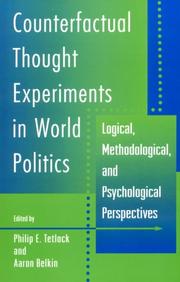| Listing 1 - 2 of 2 |
Sort by
|
Book
ISBN: 1283539853 9786613852304 1400842433 9781400842438 9780691151311 0691151318 9781283539852 Year: 2012 Publisher: Princeton, NJ
Abstract | Keywords | Export | Availability | Bookmark
 Loading...
Loading...Choose an application
- Reference Manager
- EndNote
- RefWorks (Direct export to RefWorks)
In October 1962, the fate of the world hung on the American response to the discovery of Soviet nuclear missile sites in Cuba. That response was informed by hours of discussions between John F. Kennedy and his top advisers. What those advisers did not know was that President Kennedy was secretly taping their talks, providing future scholars with a rare inside look at high-level political deliberation in a moment of crisis. Talk at the Brink is the first book to examine these historic audio recordings from a sociological perspective. It reveals how conversational practices and dynamics shaped Kennedy's perception of the options available to him, thereby influencing his decisions and ultimately the outcome of the crisis. David Gibson looks not just at the positions taken by Kennedy and his advisers but how those positions were articulated, challenged, revised, and sometimes ignored. He argues that Kennedy's decisions arose from the intersection of distant events unfolding in Cuba, Moscow, and the high seas with the immediate conversational minutia of turn-taking, storytelling, argument, and justification. In particular, Gibson shows how Kennedy's group told and retold particular stories again and again, sometimes settling upon a course of action only after the most frightening consequences were omitted or actively suppressed. Talk at the Brink presents an image of Kennedy's response to the Cuban missile crisis that is sharply at odds with previous scholarship, and has important implications for our understanding of decision making, deliberation, social interaction, and historical contingency.
Decision making --- Social interaction --- Cuban Missile Crisis, 1962. --- Deciding --- Decision (Psychology) --- Decision analysis --- Decision processes --- Making decisions --- Management --- Management decisions --- Choice (Psychology) --- Problem solving --- Human interaction --- Interaction, Social --- Symbolic interaction --- Exchange theory (Sociology) --- Psychology --- Social psychology --- Cuban Missile Crisis, Oct. 1962 --- Bay of Pigs. --- Cuba. --- Cuban missile crisis. --- ExComm. --- Executive Committee of the National Security Council. --- John F. Kennedy. --- Khrushchev. --- Soviet missiles. --- White House meetings. --- blockade. --- choice. --- collaborative narration. --- crisis talks. --- decision making. --- decision-making process. --- deliberation. --- future. --- linguistic expression. --- narrative relevance. --- nuclear missiles. --- secret recordings. --- social interaction. --- suppression. --- telephone conversation.

ISBN: 0691027919 0691027927 0691215073 Year: 1996 Publisher: Princeton, N.J. Princeton University Press
Abstract | Keywords | Export | Availability | Bookmark
 Loading...
Loading...Choose an application
- Reference Manager
- EndNote
- RefWorks (Direct export to RefWorks)
Political scientists often ask themselves what might have been if history had unfolded differently: if Stalin had been ousted as General Party Secretary or if the United States had not dropped the bomb on Japan. Although scholars sometimes scoff at applying hypothetical reasoning to world politics, the contributors to this volume--including James Fearon, Richard Lebow, Margaret Levi, Bruce Russett, and Barry Weingast--find such counterfactual conjectures not only useful, but necessary for drawing causal inferences from historical data. Given the importance of counterfactuals, it is perhaps surprising that we lack standards for evaluating them. To fill this gap, Philip Tetlock and Aaron Belkin propose a set of criteria for distinguishing plausible from implausible counterfactual conjectures across a wide range of applications. The contributors to this volume make use of these and other criteria to evaluate counterfactuals that emerge in diverse methodological contexts including comparative case studies, game theory, and statistical analysis. Taken together, these essays go a long way toward establishing a more nuanced and rigorous framework for assessing counterfactual arguments about world politics in particular and about the social sciences more broadly.
International relations. Foreign policy --- Methods in social research (general) --- History as a science --- World politics. --- History --- Counterfactuals (Logic) --- Thought experiments. --- Philosophy. --- World politics --- -Counterfactuals (Logic) --- Thought experiments --- #SBIB:327H03 --- #SBIB:327.1H10 --- Experiments, Thought --- Methodology --- Contrary-to-fact conditional --- Counterfactual conditionals --- Conditionals (Logic) --- Logic --- Annals --- Auxiliary sciences of history --- Colonialism --- Global politics --- International politics --- Political history --- Political science --- World history --- Eastern question --- Geopolitics --- International organization --- International relations --- Philosophy --- Internationale betrekkingen: onderwijs en onderzoek --- Internationale betrekkingen: theorieën --- Counterfactuals (Logic). --- History, Modern --- Gedankenexperiment --- Internationale Politik --- Weltpolitik --- Azerbaijan crisis. --- Bay of Pigs. --- Goldstone, Jack. --- Halifax, Lord. --- Iranian revolution. --- Jowitt, Ken. --- Khrushchev, N. --- Leninism. --- Napoleon. --- Nash equilibrium. --- Qavam. --- Riser, E. --- Russian revolution. --- Stalinism. --- Thucydides. --- data scarcity. --- experimental method. --- hindsight. --- legitimacy issues. --- moral catastrophes. --- nomothetic counterfactuals. --- optimality constraints. --- perfect equilibrium. --- policy makers. --- proximity criterion. --- reification. --- structuralism. --- tripolar world. --- Politique mondiale --- Histoire --- Contrefactuel (logique) --- Pensée --- philosophie --- expériences --- Weltordnungspolitik --- Politik --- Internationale Beziehungen --- Politische Beziehungen --- Zwischenstaatliche Beziehungen --- Außenpolitik --- Internationales politisches System --- Experiment --- Pensée --- expériences
| Listing 1 - 2 of 2 |
Sort by
|

 Search
Search Feedback
Feedback About UniCat
About UniCat  Help
Help News
News